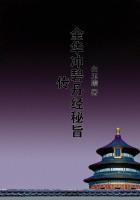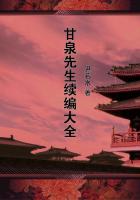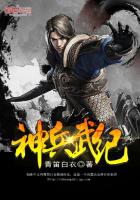"Ho my steed, we must climb one more hill! My reputation depends upon my report!"Anookasan addressed his pony as if he were a human companion, urged on like himself by human need and human ambition.And yet inhis heart he had very little hope of sighting any buffalo in that region at just that time of the year.
The Yankton Sioux were ordinarily the most far-sighted of their people in selecting a winter camp, but this year the late fall had caught them rather far east of the Missouri bottoms, their favorite camping-ground. The upper Jim River, called by the Sioux the River of Gray Woods, was usually bare of large game at that season. Their store of jerked buffalo meat did not hold out as they had hoped, and by March it became an urgent necessity to send out scouts for buffalo.
The old men at the tiyo teepee (council lodge) held a long council. It was decided to select ten of their bravest and hardiest young men to explore the country within three days' journey of their camp.
"Anookasan, uyeyo-o-o, woo, woo!" Thus the ten men were summoned to the council lodge early in the evening to receive their commis- sion. Anookasan was the first called and first to cross the circle of the teepees. A young man of some thirty years, of the original native type, his massive form was wrapped in a fine buffalo robe with the hair inside. He wore a stately eagle feather in his scalp-lock, but no paint about his face.
As he entered the lodge all the inmates greeted him with marked respect, and he was given the place of honor. When all were seated the great drum was struck and a song sung by four deep-chested men. This was the prelude to a peculiar ceremony.
A large red pipe, which had been filled and laid carefully upon the central hearth, was now taken up by an old man, whose face was painted red. First he held it to the ground with the words: "Great Mother, partake of this!" Then he held it toward the sky, saying: "Great Father, smoke this!" Finally he lighted it, took four puffs, pointing it to the four corners of the earth in turn, and lastly presented it to Anookasan. This was the oath of office, administered by the chief of the council lodge. The other nine were similarly commissioned, and all accepted the appointment.
It was no light task that was thus religiously enjoined upon these ten men. It meant at the least several days and nights of wandering in search of signs of the wily buffalo. It was a public duty, and a personal one aswell; one that must involve untold hardship; and if over- taken by storm the messengers were in peril of death!
Anookasan returned to his teepee with some misgiving. His old charger, which had so often carried him to victory, was not so strong as he had been in his prime. As his master approached the lodge the old horse welcomed him with a gentle whinny. He was always tethered near by, ready for any emergency.
"Ah, Wakan! we are once more called upon to do duty! We shall set out before day- break."As he spoke, he pushed nearer a few strips of the poplar bark, which was oats to the Indian pony of the olden time.
Anookasan had his extra pair of buffaloskin moccasins with the hair inside, and his scanty provision of dried meat neatly done up in a small packet and fastened to his saddle. With his companions he started northward, up the River of the Gray Woods, five on the east side and a like number on the west.
The party had separated each morning, so as to cover as much ground as possible, having agreed to return at night to the river. It was now the third day; their food was all but gone, their steeds much worn, and the signs seemed to indicate a storm. Yet the hunger of their friends and their own pride impelled them to persist, for out of many young men they had been chosen, therefore they must prove them- selves equal to the occasion.
The sun, now well toward the western hori- zon, cast over snow- covered plains a purplish light. No living creature was in sight and the quest seemed hopeless, but Anookasan was not one to accept defeat.
"There may be an outlook from yonder hill which will turn failure into success," he thought, as he dug his heels into the sides of his faith- ful nag. At the same time he started a "Strong Heart" song to keep his courage up!
At the summit of the ascent he paused and gazed steadily before him. At the foot of the next coteau he beheld a strip of black. He strained his eyes to look, for the sun had al- ready set behind the hilltops. It was a great herd of buffaloes, he thought, which was graz- ing on the foot-hills.
"Hi hi, uncheedah! Hi, hi, tunkasheedah!" he was about to exclaim in gratitude, when, looking more closely, he discovered his mistake.Thedark patch was only timber.
His horse could not carry him any further, so he got off and ran behind him toward the river. At dusk he hailed his companions.
"Ho, what success?" one cried.
"Not a sign of even a lone bull," replied an- other.
"Yet I saw a gray wolf going north this evening. His direction is propitious," re- marked Anookasan, as he led the others down the slope and into the heavy timber. The river just here made a sharp turn, forming a densely wooded semicircle, in the shelter of a high bluff.
The braves were all downhearted because of their ill-luck, and only the sanguine spirit of Anookasan kept them from utter discourage- ment. Their slight repast had been taken and each man had provided himself with abundance of dry grass and twigs for a bed. They had built a temporary wigwam of the same mate- rial, in the center of which there was a gen- erous fire. Each man stretched himself out upon his robe in the glow of it. Anookasan filled the red pipe, and, having lighted it, he took one or two hasty puffs and held it up to the moon, which was scarcely visible behind the cold clouds.
"Great Mother, partake of this smoke! May I eat meat to-morrow!" he exclaimed with solemnity. Having uttered this prayer, he handed the pipe to the man nearest him.
For a time they all smoked in silence; then came a distant call.















